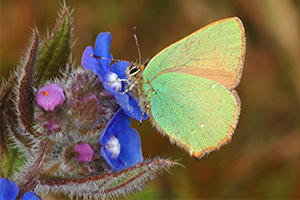Broadland: Volunteer efforts promoting biodiversity at country park

Broadland District Council has been working with a team of volunteers to preserve and understand the unique ecology and biodiversity of the new Broadland Country Park.
“We are extremely grateful for these volunteers’ time and efforts in helping to maintain and preserve this precious site for future generations to enjoy. “The wildlife and biodiversity of our newest community asset and conservation area, ‘Broadland Country Park’, would not be in such good condition or so well understood without the hard work of the volunteers and what better week than to celebrate their achievements than Volunteers Week.”
said Cllr Jo Copplestone, Portfolio Holder for Economic Development.
The park was recently acquired and opened by Broadland District Council to preserve some of the country’s rarest and most important habitats as well as providing high quality green space for local residents.
Open heathland like that at Broadland Country Park is important for rare birds like nightjars and woodlarks, the heathland is being restored by volunteers grubbing out scrubby pine and birch trees by hand, known as ‘scrub bashing’.
Over the winter volunteers coordinated by the council have contributed 340 hours of ‘scrub bashing’. One individual, single-handedly clocked up 170 hours, or 23 working days. When asked why he did it, volunteer Dave Weaver, said:
“It’s a very satisfying way to keep fit, healthy, enjoy the outdoors and become immersed in and learn about nature while trying to do something positive for the environment and wildlife.”
Since the spring, volunteers from the Norfolk and Norwich Naturalists Society (NNNS) began visiting Broadland Country Park to start a three year project on the ecology and biodiversity of the area, information that’s vital for sound management, restoration and conservation.
County experts on plants, butterflies, beetles, bees, fungi, birds and mammals have been in the field cataloguing the species on the site. New and important finds have already been made, such as the rare bog beacon fungus, a green hair streak butterfly and a ladybird so rare it doesn’t even have an English name.
NNNS Research Committee Chair, Dr Mark Collins said:
“There’s a lot left to do, but by the time we’re finished Broadland Country Park will be one of the best-known sites in Norfolk – and all due to voluntary effort.”
If you are interested in volunteering at Broadland Country Park, please get in touch by email, broadlandcountrypark@southnorfolkandbroadland.gov.uk or visit the Broadland Country Park webpage for more information.
Published: 4 June 2021